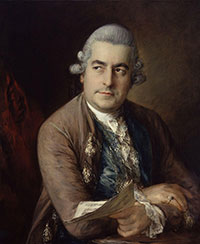 Johann Sebastian Bach is undoubtedly one of the most famous composers in history. His contributions to Lutheran music have made the family name synonymous with that German sacred tradition. Once, when discussing music, my local priest at the time, told me Bach was the only good thing to come out of the Reformation. It made me laugh even though I’m not entirely sure he was joking.
Johann Sebastian Bach is undoubtedly one of the most famous composers in history. His contributions to Lutheran music have made the family name synonymous with that German sacred tradition. Once, when discussing music, my local priest at the time, told me Bach was the only good thing to come out of the Reformation. It made me laugh even though I’m not entirely sure he was joking.
Bach’s religious nature was not separate from his career – it was a critical aspect of who he was. At the top of his sacred compositions, he wrote the initials “J.J.” – an abbreviation of the Latin “Jesu Juva” (“Jesus help”) and at the end, “S.D.G.” for “Soli Deo Gloria” (“To God alone be the glory”).
Bach had many children from his first marriage, which ended with his wife’s death, and many more with his second wife.
Several sons became professional musicians, the most famous being C.P.E. Bach (1714-1788). His youngest surviving son was Johann Christian Bach (1735-1782), affectionately nicknamed among musicians as the “London Bach.” J.C. Bach was born in Leipzig, where he received his musical training under his father’s teaching until the senior Bach’s death in 1750. From there, he moved to Berlin where his older half-brother, C.P.E., was working for Frederick the Great, King of Prussia, who was also a fine musician himself.
When he was 20, J.C. made a life-changing move to Milan, Italy. There he converted to Roman Catholicism, leaving behind his staunchly Lutheran upbringing. His music stemming from this period is primarily written for the Church while he was employed as an organist at the Milan Cathedral. His time in Italy also impacted a genre in which his famous father never composed: the Italian opera.
J.C. then moved to London and took on the more English-sounding name of John, eventually becoming music master to Queen Charlotte. Today we know of her as the namesake of Charlotte – the seat of our diocese.
London was one of the first European cities to offer public concerts, and J.C. performed one of the first solo concerts on the keyboard instrument becoming fashionable at the time: the pianoforte (or piano, as it is called today).
It was in London that another equally famous composer, Wolfgang Amadeus Mozart, met J.C., while on his extensive travels as a child musical prodigy. During their visits together, they reportedly played harpsichord duets. Mozart even arranged some of J.C.’s music from solo sonatas into piano concerti (music for piano and orchestra).
Like Mozart, J.C. lived a relatively short life, dying in poverty in 1782 after a long illness. Yet along with his famous family name, his musical legacy lives on.
— Christina L. Reitz. Portrait of Johann Christian Bach, painted in London by Thomas Gainsborough, 1776.
Listen online
While J.C. Bach’s musical influence was primarily on instrumental works, his gift of lyricism is on full display in his choral works, as seen in the soprano solo in the opening to his “Magnificat in C major.” Listen to a performance by the Süddeutscher Kammerchor and the Concerto Köln, directed by Gerhard Jenemann.


